On April 20, 1994, a 64K international dedicated line realized the full functional connection between China and the international interconnection, and since then China has become the 77th country with a full functional interconnection. Over the past 30 years, the Internet has had a profound impact on China's economy and society and brought fundamental changes to our daily lives.
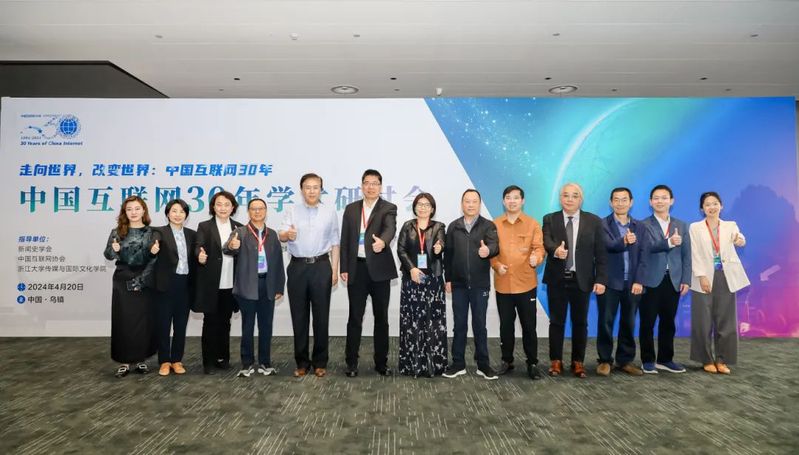
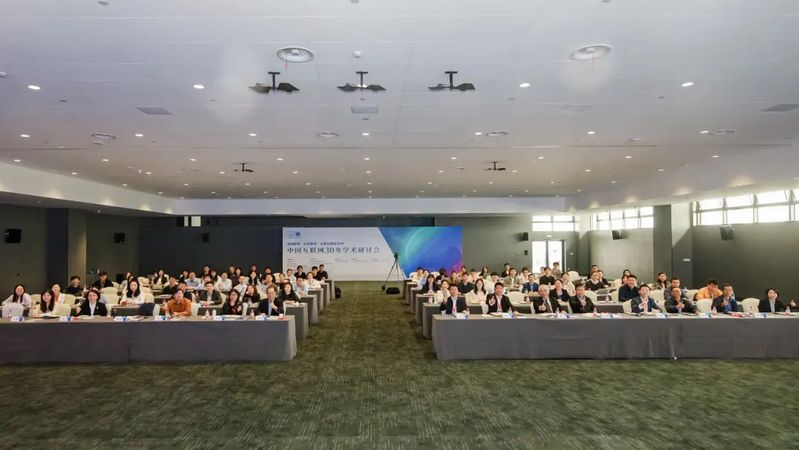
On April 20, 2024, on the occasion of the 30th anniversary of China's formal access to the Internet, under the guidance of the Chinese Journalism History Association and the Internet Society of China, the School of Media and International Culture, Zhejiang University, Jiangsu Media Development Institute, Organized by Zhejiang Province Common Prosperity Cultural Innovation Center, organized by Wuzhen Digital Civilization Research Institute, co-organized by Zhejiang University International spread Research Center, supported by Media Watch and Modern Publishing, the Chinese Internet 30 Years Academic Seminar was held in Wuzhen World Internet Science and Technology Museum. Experts and scholars from all over the country shared and exchanged views on issues related to China's Internet over the past 30 years.
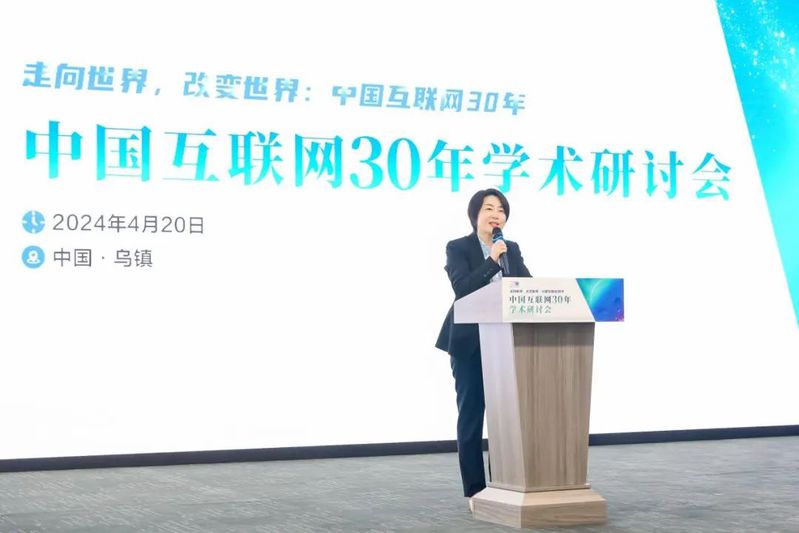
The keynote speech in the morning was hosted by Zhao Yu, Vice Dean of School of Media and International Culture, Zhejiang University.
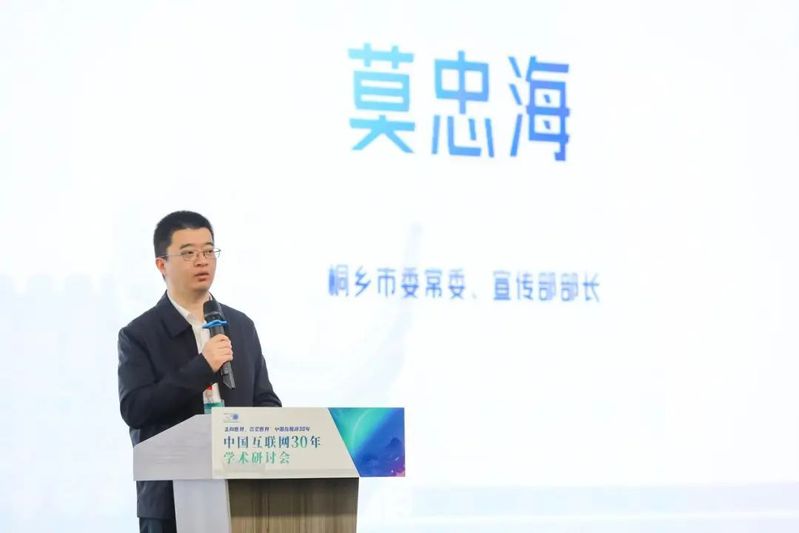
Mo Zhonghai, member of the Standing Committee of Tongxiang Municipal Party Committee and Minister of Propaganda Department, delivered an opening speech.He first welcomed the guests and pointed out that under the guidance of the important ideas of network power, China's Internet has gradually grown from a budding state to one of the world's largest Internet markets, making important contributions to the global informatization process.The rapid innovation of Internet technology, the vigorous development of the industry and the profound impact on various fields of society have fully demonstrated the strong strength and unlimited potential of China's Internet. As the permanent venue of the World Internet Conference Wuzhen Summit, the Summit has been held for ten consecutive years and has become an important platform to promote global Internet governance reform, promote global economic development and promote the progress of human civilization. Tongxiang has taken this platform to actively expand in the Internet industry and Internet governance and has achieved a series of fruitful results. He said that standing at a new historical starting point, Tongxiang will continue to promote China's Internet industry to a new level and contribute wisdom and strength to the realization of the dream of a network power.
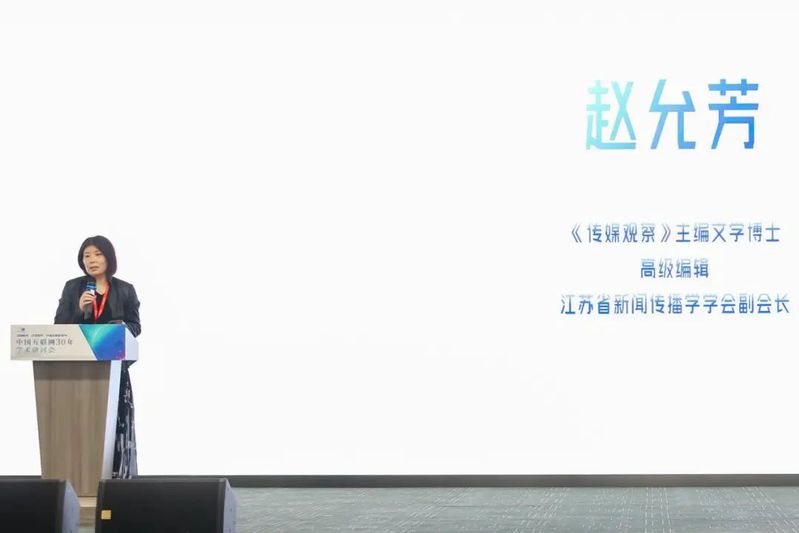
Zhao Yunfang, editor-in-chief of Media Observation, delivered a keynote speech. After reviewing the magnificent course of China's Internet from its birth to the present, she pointed out that in the past 30 years, China's Internet has grown from scratch, from small to large, from weak to strong, and has made remarkable achievements. Today, the Internet has penetrated into every aspect of Chinese society and has become an important force in promoting economic development and improving people's lives. Later, she shared the transformation and development experience of Xinhua Media Group in the Internet era, which is not only a profound understanding and grasp of the Internet, but also an active exploration of media integration and development. At present, new technologies such as generative AI have brought revolutionary changes to journalism, but they also face many challenges. Journalism and communication academia and industry need to work together to respond and promote the sustainable development of journalism. She said that to celebrate the 30th anniversary of the Chinese Internet, Media Watch launched a research column entitled 30 Years of the Chinese Internet. This column studies the development of China's Internet from multiple perspectives, providing strong support for a more systematic and profound study and understanding of the Internet. I hope to continue to strengthen exchanges with all walks of life and jointly promote the development of China's Internet cause.
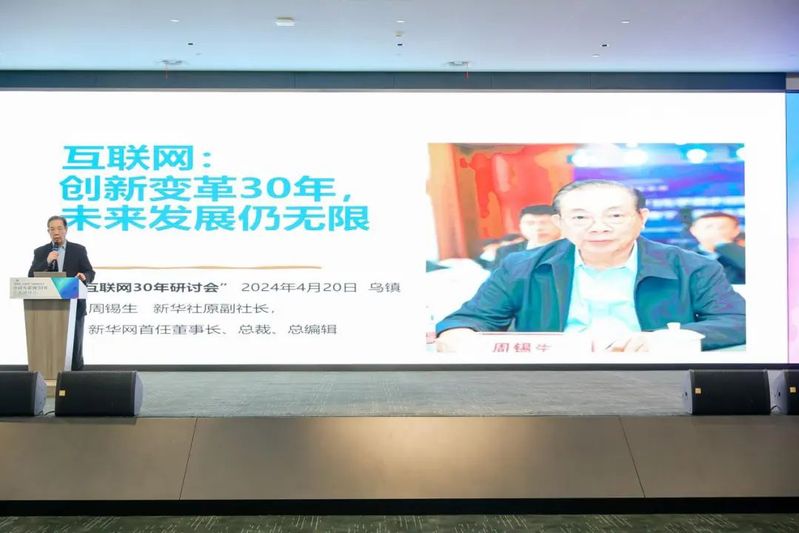
Zhou Xisheng, former Vice President of Xinhua News Agency, former Chairman, President and Editor-in-Chief of Xinhuanet, and senior expert in network communication of the Cyberspace Administration of China, delivered a keynote speech entitled Internet: 30 Years of Innovation and Reform, Unlimited Future Development. He first elaborated on the development process of China's Internet in the past 30 years, and believed that the current development of the Internet in China is amazing, fast, stable and strong, and its iterative update and promotion of media integration are irresistible. For the future development of China's Internet, he put forward four needs: first, learn more from the Davos World Economic Forum, and have in-depth thoughts and forward-looking thinking; Second, we should pay attention to the research and development of the theory and practice of the Internet, Internet + and the Internet to the new expansion; Thirdly, Wuzhen World Internet Congress and Zhejiang University School of Media and International Culture should be utilized to strengthen the international spread of network and strengthen the competitive development of Internet in Wuzhen. Fourth, we must make full use of the unique brand and unique resources of Wuzhen International Internet Town.
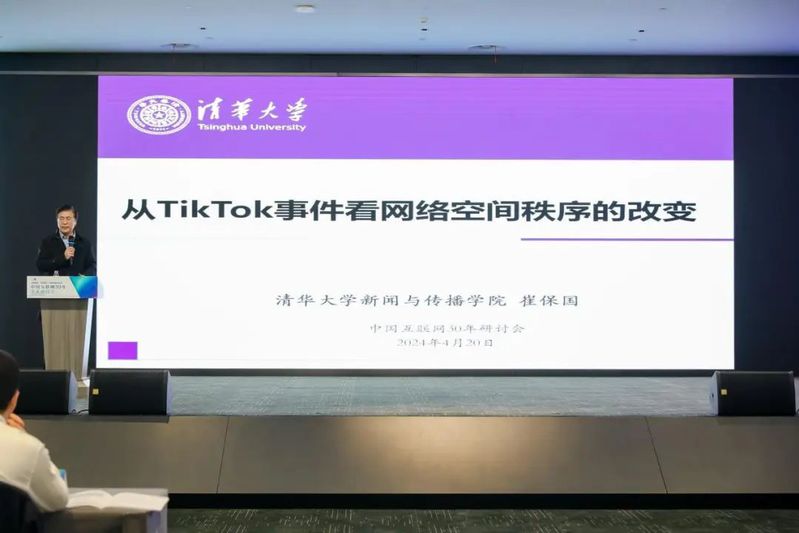
Professor Cui Baoguo, School of Journalism and Communication, Tsinghua University, delivered a keynote speech entitled Changes in Cyberspace Order from TikTok Incident. He has studied China's Internet for 30 years from three perspectives: media, global and historical, and pointed out that the Internet is an important new qualitative productivity. In the era of digital economy, data is the primary factor of production, and artificial intelligence is the primary power of production. The race to build on the digital economy is taking place simultaneously around the world. The TikTok incident, as a landmark case, highlights the China threat argument played up by the United States. Although the United States has banned TikTok and proliferated within its allied systems, it has not provided any conclusive evidence that TikTok has caused actual damage to U.S. national security. Professor Cui Baoguo further analyzed the impact of TikTok incident on the order of cyberspace, pointing out that network content and data have become key factors in shaping the order of cyberspace. In addition, cyberspace is gradually shifting from high walls of small courtyards to low walls of large courtyards. The US crackdown on China's digital sector hinders the healthy development of the global digital economy. How to ensure the security of the domestic network order, but also to ensure full contact with the international community, reflecting China's wisdom, is the key to our next step in the development of the Internet.
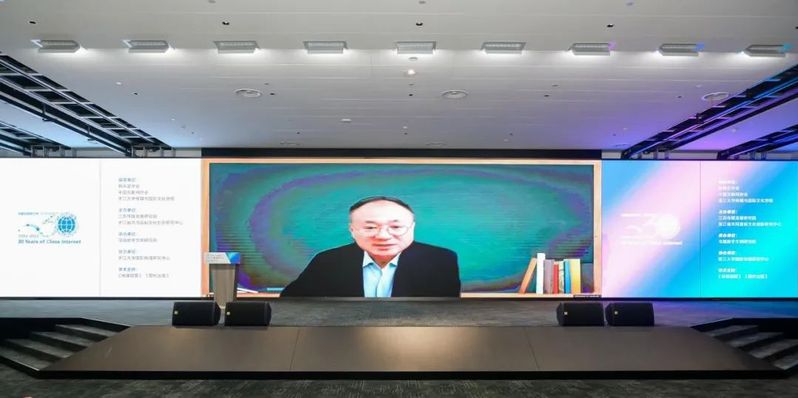
Professor Hu Zhengrong, Director of the Institute of Journalism and Communication, Chinese Academy of Social Sciences, delivered a video speech titled 30 Years of Internet and Chinese Media: Uncertainties and Certainties. He elaborated on the three stages of Chinese media before the Internet 30 years ago, the Chinese media in the Internet in 30 years, and the Chinese media after the Internet 30 years ago. It is believed that the evolution of media and the iterative process of Internet formats are the same, but the speed is not synchronized, and a considerable number of media are still stuck in the era of integration 1.0. Expect the new generation of information technology to bring subversive changes to the media. He analyzed the uncertainties of the future development of the Internet from the aspects of digital and real integration, nationalization, technological subversion and communication pattern-social formation, and believed that the certainty of the Internet and Chinese media is authenticity, professionalism, constructiveness and value pursuit. In the future development, we must both subvert uncertainty and maintain certainty.
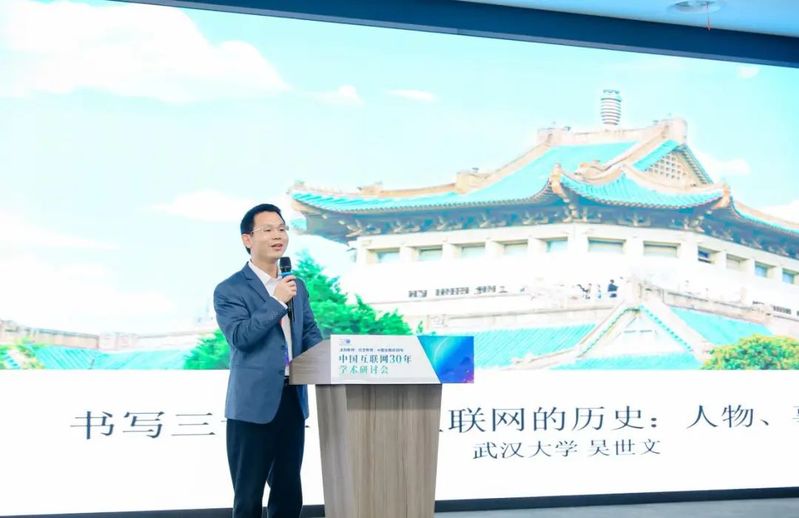
Professor Wu Shiwen, School of Journalism and Communication, Wuhan University, delivered a keynote speech entitled Writing the 30-year History of China's Internet: People, Events and Concepts. He believes that the trajectory of the Internet can be better understood by studying the people in it. The netizen is the person in Internet, but the person in Internet has common identity, have different self-identity again at the same time. He also stressed the importance of events in history, such as the 1996 billboard incident and the 1997 netizen Lao Yong's article, which also form part of Chinese Internet history. He also highlighted the role of ideas in the development of the Internet, noting that the Internet has brought new ideas and ways of thinking that have had a profound impact on Chinese society. He called for in-depth research on the history of the Chinese Internet, discussing human experience and historicity, and seeking a balance between theory and data collection and description. The question of how to recount the history of the Internet in China and the world from a comparative perspective or a global historical perspective is a larger proposition.
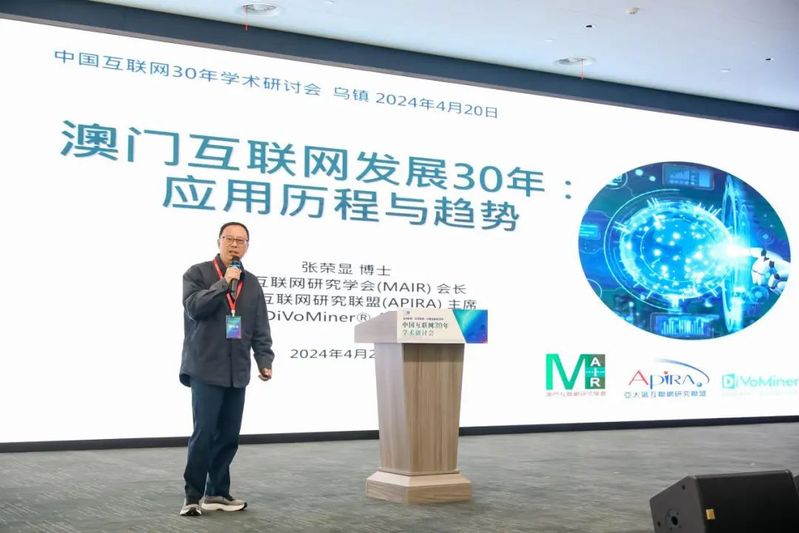
Teo Vinh Hien, President of Macao Internet Research Association (AIR) and President of Asia Pacific International Research Alliance (APIRA), delivered a speech entitled 30 Years of Internet Development in Macao: Application History and Trends. He first introduced the research results of the Macao Internet Research Society and the Macao Internet Studies Program since 2001. From the first optical fiber access in 1983 to the development of the smart Internet after 2020, the number of Macao residents using the Internet, the way and the purpose have changed greatly, forming a universal and unique Internet application situation and trend. In 2023, Macau's ICT Development Index (IDI) ranks 21st in the world, with both the size and frequency of online households at a high level. The construction of Digital Macau is underway and the smart city has been included in the Macao Special Administrative Region's Five-Year Development Plan. Macau's Internet access continues to rise, the digital divide is closing, social media is becoming more prevalent, mobile Internet is trending and is mainly focused on entertainment activities. For the future development of the Internet in Macao, it is necessary to attach importance to the Internet suitability of Macao and the healthy online environment of minors, continue to develop social intelligence, AI drive and digital payment, and strengthen cyber security education.
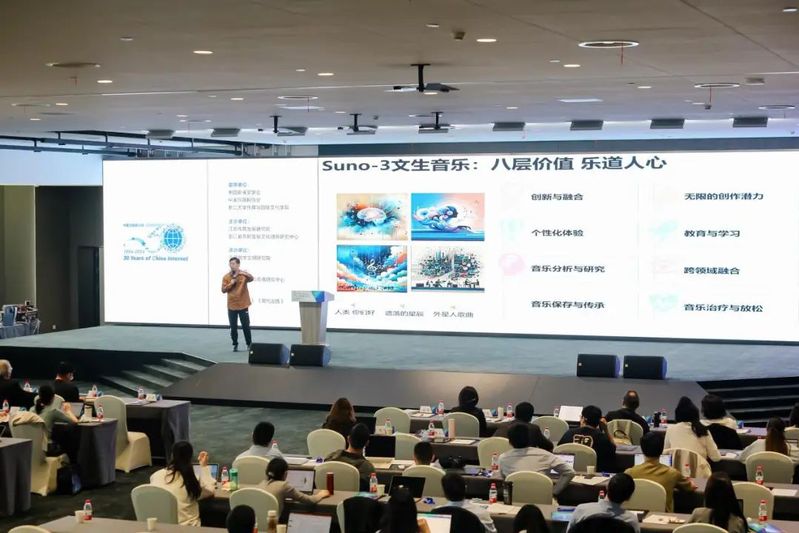
Shenyang, a professor at the School of Journalism and Communication of Tsinghua University and director of the Yuan Cosmos cultural laboratory, delivered a speech entitled Looking into the future from the past: Looking into the next 30 years from the internet. Professor Shenyang first talked about the five intelligent platforms, namely Chat GPT4 in the text field, Midjourney 6 in the image field, Suno-3 in the field of music, Sora in the field of video, and FSD12.3 in the field of automatic driving have passed the Turing test one after another. Using poems, songs, pictures and videos to prove that Wensheng Wen, Wensheng Tu, Vinsheng Music, and Wensheng Drama have a unified generation theory framework and algorithm foundation. He believes that the development of China's Internet in the past 30 years from 0 to the world's second is due to its openness, high degree of centralization, platform and high degree of virtualization. In the past 30 years, the development of the Internet has been characterized by rapid and magnificent changes. For the future development of China's internet 30 years, Professor Shenyang believes that the first decade of the future development of the internet is the AI optimization of human existing work, In the second decade, AI will develop into autonomous work for humans, and in the third decade, humans will use more internetworking at the brain-computer interface level, and the popularity of virtual humans in the future. With the wave of future internetworking development and the popularization of AR and VR, the role of mobile phones may be weakened, thus developing experience internetworking and consciousness internetworking.
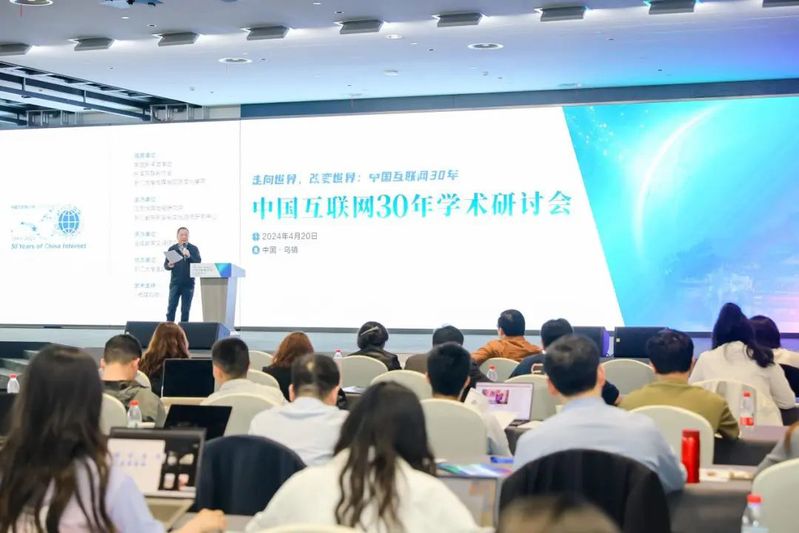
Hu Jiansheng, executive deputy director of the former National Informatization Evaluation Center, reviewed the history of the development of the Chinese Internet in his speech. The Chinese Internet started on September 20, 1986, when Qian Tianbai sent his first email, and registered the Chinese top-level domain name on November 28, 1990. On the occasion of the 30th anniversary of the Chinese Internet, he put forward three points of understanding: First, the Internet has changed the world, but in essence, it is communication that determines the world pattern; The second is that while the world has become more equal, that does not mean it is fair. The digital divide, the facilitation of crime and war, and decentralization exacerbate social inequality. Third, decentralization eventually led to a more centralized phenomenon. He called attention to these issues, arguing that if left unattended, the world could go in a different direction. Hu also noted that the recent success of Oppenheimer, which won seven Academy Awards, touches on the profound problems posed by industrial society, suggesting that the information society may have an impact similar to that of the atomic bomb. Finally, he quoted Qian Tianbai's famous words in an email sent in 1987, Crossing the Great Wall, leading to the world, to call on the international community to increasingly become a community of human destiny.
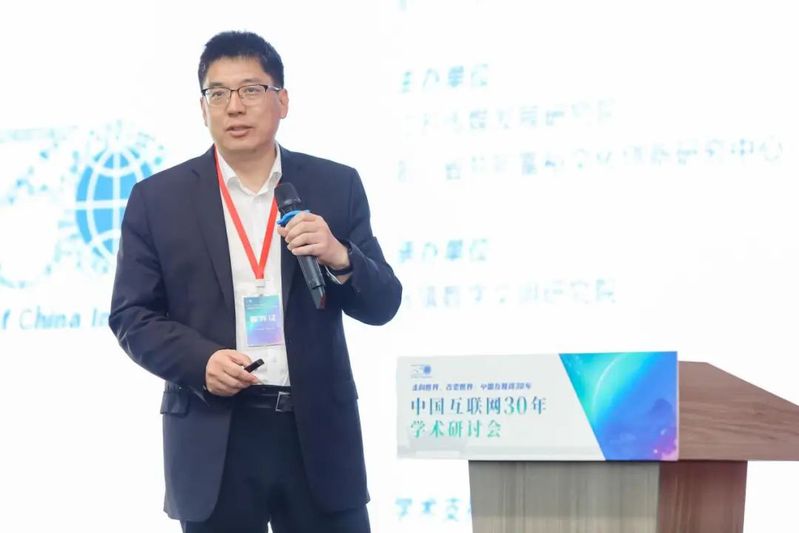
Professor Fang Xingdong, executive vice dean of the School of Media and International Culture of Zhejiang University and dean of Wuzhen Digital Civilization Research Institute, delivered a keynote speech entitled From Cathedral to Bazaar: The Chinese Significance of the Internet in 30 Years. The essence of the Internet is an open system, and the transformation from cathedral to bazaar marks a change in the mode of communication. With the development of artificial intelligence, big data and other technologies, intelligent communication is rising and has become a new trend in the development of the Internet. Communication is facing the greatest impact of the age of intelligence, but it is also a historic opportunity for communication. As the center of the whole society, communication studies are expected to become a leading and pivotal discipline and play a more important role in the era of intelligence. At present, China's Internet industry still lacks in innovation and research and development, and needs to cross the cycle trap. The Internet is not only high-tech in nature, but also an open system, and its nature determines its role and development. He appeals, chinese Internet should become the platform of an international spread, let the world understand China truly, blend in globalization. The Internet spirit is the driving force for the development of the Internet, and China should shoulder the banner of the Internet spirit and contribute to the digital development of Asian, African and Latin American countries. In the next 30 years, the mission of the Internet is to bring China fully into the world and let the world truly understand China. This will be an era full of challenges and hopes. China's Internet needs to explore an open system. It needs to change from 1.4 billion people's mind to 8 billion people's mind. It needs to make breakthroughs not only in domestic communication, but also in international communication. This is an important task for the discipline of journalism and communication to be reconstructed, and it is also the future mission of the Internet.
In addition, the father of the Korean Internet, Jeon Gil Nam, sent a message via the Internet. He pointed out that the development of China's Internet in the past 30 years has been remarkable, and believed that the Internet has profoundly changed China in many aspects, the most notable of which is its huge contribution to the digital economy. In his view, the popularity and development of the Internet have promoted the rapid growth of China's digital economy, spawned many new business forms and business models, and changed people's way of life, communication and thinking. It can be said that the Internet has become an indispensable part of modern Chinese society and has had a profound impact on China's development.
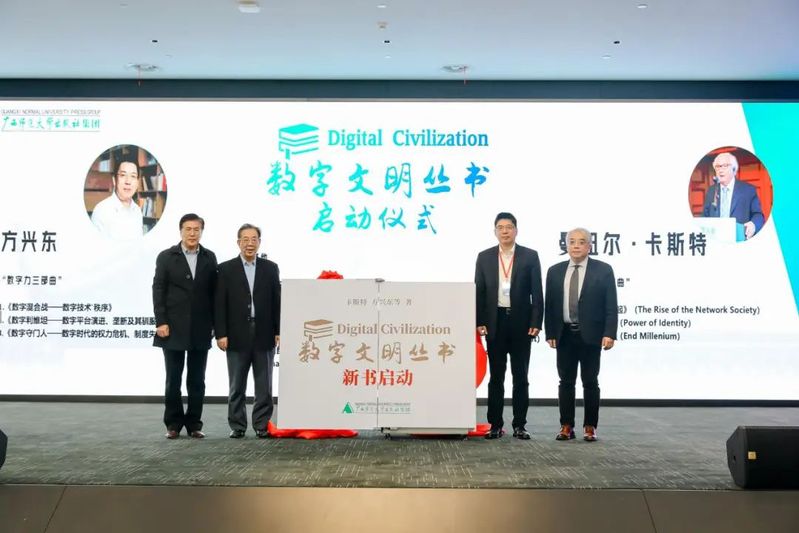
The launch ceremony of the Digital Civilization Series was also held at the meeting. Cui Baoguo, Professor, School of Journalism and Communication, Tsinghua University; Liu Guanghan, Deputy Editor-in-Chief, Guangxi Normal University Press (Shanghai) Co., Ltd. Zhou Xisheng, former vice president of Xinhua News Agency, former chairman, president and editor-in-chief of Xinhuanet, and senior expert in network communication of the Central Cyberspace Administration of China, and Fang Xingdong, executive vice president of the School of Media and International Culture of Zhejiang University and dean of Wuzhen Digital Civilization Research Institute, came to the stage to unveil the project.
In the afternoon, each sub-forum held paper reports and comments.

Sub-forum I was co-chaired and reviewed by Zhao Yunfang, editor-in-chief of Media Observer, and Zhao Yupei, researcher of Hundred Talents Plan and doctoral supervisor of School of Media and International Culture, Zhejiang University. The sub-forum focused on the theme of Policy Development and Future Trends, and discussed the topic of The Evolution of China's Internet Policies over the Past 30 Years and Improving the Certainty of Future-oriented Development. Focusing on the role of policy in the past 30 years of China's Internet, they shared their research progress and insights on how policy can build a more harmonious network environment and the future development direction of China's Internet. Zhao Yunfang and Zhao Yupei put forward specific suggestions for each paper, emphasizing that in the digital age, we should not only understand China's Internet policies from various perspectives, but also constantly think about the practical significance of research issues, and always maintain a rigorous academic attitude. It is hoped that the participating scholars will conduct in-depth research on the problems that need to be solved in academia and industry, and make outstanding contributions to the healthy development of the Internet in China in the future.
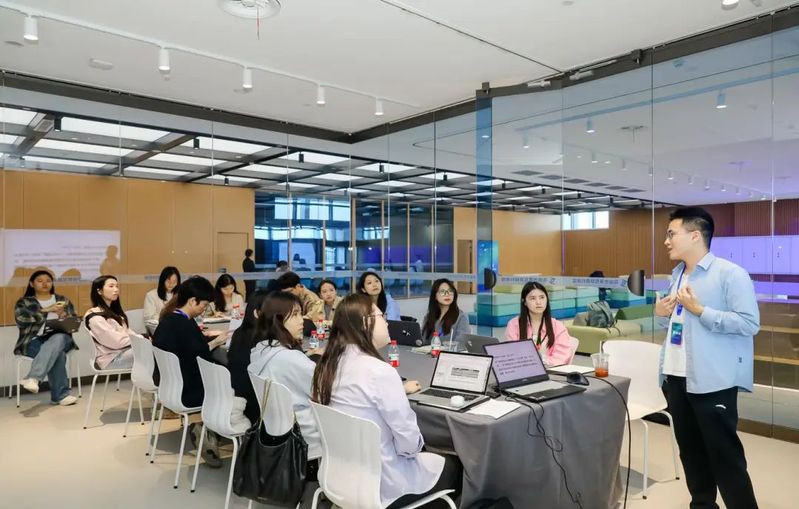
The second sub-forum was co-chaired and reviewed by Jiang Lulu, editor of Media Observer, and Wang Wei, researcher and doctoral supervisor of the Hundred Talents Plan of the School of Media and International Culture of Zhejiang University. The forum focused on the theme of technology empowerment and discourse construction, and participants focused on emotion and artificial intelligence, Digital technology and survival environment, Internet discourse analysis, Internet meta-architecture and protocol and other issues made a wonderful speech sharing, a detailed analysis of each Internet-related theme, focusing on the technical development of China's Internet, Internet architecture and the role of generative AI. The two evaluation teachers believed that the young scholars' topics were bold and novel, analyzed the combination of Internet technology and various industries in life from different angles, and gave pertinent suggestions on the research results of each speaker.
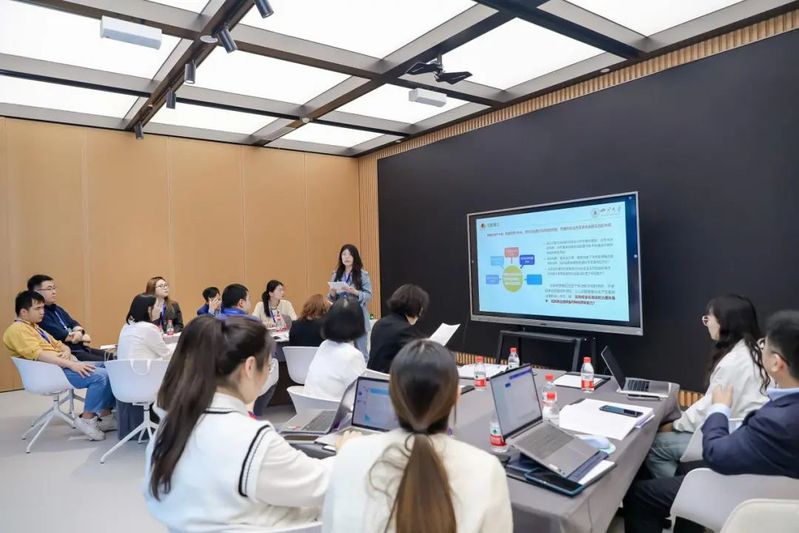
Sub-forum 3 was co-chaired and reviewed by Professor Qu Ru, Director of the Publicity Department of Beijing International Studies University, and Yan Yunxia, Assistant Editor-in-Chief of Media Watch. The forum focused on the topic of media convergence, international communication and internet governance, focusing on media convergence system of evaluation, new forms of international spread, internet governance in China, and interdisciplinary studies related to communication. The two professors hope that young scholars can continue to explore the media convergence, international spread and network governance in the context of artificial intelligence, and provide new perspectives.
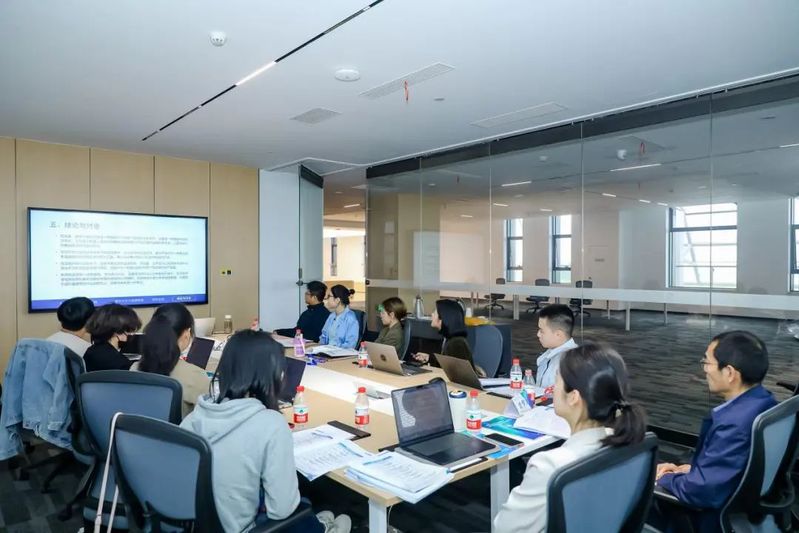
Sub-forum 4 was co-chaired and reviewed by Jia Mengyu, deputy editor-in-chief of Media Observer, and Huang Qing, researcher of Hundred Talents Plan and doctoral supervisor of School of Media and International Culture, Zhejiang University. The forum focused on the theme of Network Society and Digital Life. The participants made wonderful sharing on digital communication, digital migration, media literacy, network negotiation, network social norms, network subculture, platform governance, digital economy and other topics, showing the young scholars' meticulous observation and profound understanding of digital life. Jia Mengyu and Huang Qing commented on the paper that we are not only facing new opportunities brought by technological development, It is also necessary to continue to think about the various social, cultural and individual psychological impacts of networking and digitalization, and I hope that all young scholars will continue to explore academic issues related to digital life and contribute wisdom to building a community of shared future in cyberspace.
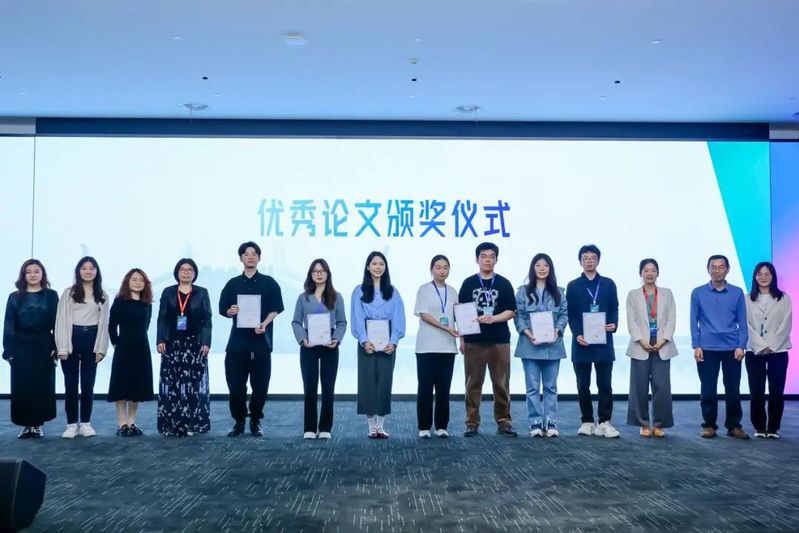
At the award presentation and closing ceremony of the conference, Zhao Yupei read out the list of winners of this seminar and expressed his gratitude to all participants of this seminar. She said that China's Internet 30 years is an important opportunity, everyone at this moment to review this magnificent history, share academic insights, exchange ideas and wisdom. We look forward to more opportunities in the future, and we will continue to write the Wuzhen Appointment in China's Internet history.

